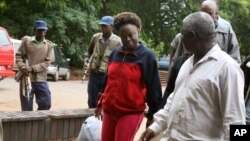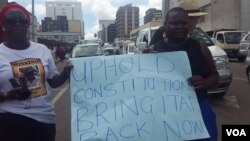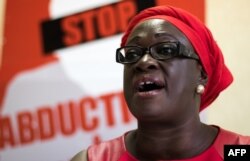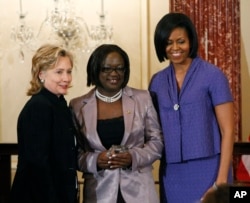The Zimbabwe High Court has ordered the state to compensate prominent pro-human rights campaigner Jestina Mukoko $150,000 over her abduction and torture by state security agents in 2008.
In a joint statement, Mukoko’s Zimbabwe Peace Project (ZPP) and her legal defenders from the Zimbabwe Lawyers for Human Rights (ZLHR) welcomed the “judicious decision handed down by the High Court, which on 27 September 2018 ordered the state to pay $150,000.”
In a Deed of Settlement endorsed by the High Court, the defendants have been ordered to pay $100,000 to Mukoko in respect of her claims while a further $50,000 will be paid as a contribution towards her legal costs. The High Court ordered that the total payment of $150,000 must be made on or before 31 October 2018.
BACKGROUND INFORMATION
Mukoko was abducted by some unidentified armed men from her home in Norton, just outside Harare, on 3 December 2008, and her whereabouts together with two ZPP employees Broderick Takawira and Pascal Gonzo, who were also abducted later in December 2008, remained unknown until December 24, 2008, when they first appeared before the Harare Magistrates Court, after weeks of being held incommunicado and being tortured.
They were accused of plotting to topple former President Robert Mugabe through allegedly recruiting people to undergo military training in neighboring Botswana.
After her release from a torturous three months stay in prison, Mukoko with the assistance of her lawyer Beatrice Mtetwa, a member of ZLHR, took legal action against the state.
According to the ZLHR, in September 2009, the Supreme Court granted a permanent stay of prosecution in favour of Mukoko “due to the violation of several of her fundamental rights by state security agents as she had been subjected to torture and inhuman and degrading treatment including simulated drowning, being locked in a freezer and being subjected to physical assaults as her tormentors tried to make her confess to plotting to overthrow the administration of Zimbabwe’s former leader Robert Mugabe.”
In 2017, the High Court ruled that those who had illegally arrested her could be held liable in their own individual capacities and the case culminated in lengthy protracted negotiations that have led to this outcome. But Mukoko told VOA Studio 7 she is no longer interested in pursuing her alleged abductors as she seeks to put the painful past behind her.
SIGNIFICANCE OF MUKOKO CASE
In an exclusive interview with VOA Studio 7 for Zimbabwe, Mukoko said “This outcome will not make up for the scars inflicted on me but it will contribute to the healing process while emboldening all those who may still be pursuing justice against the excesses of the state, including those who suffered a similar fate like mine, who are yet to get justice. I am aware, others that were abducted and disappeared as me, have had their cases stagnant with not much progress as the files are said to have been sitting in ‘one office’ for many, many years. I take that again, many, many years!”
Mukoko added in a statement, “The patrimonial settlement cannot atone for the trauma and suffering that I suffered and went through at the hands of the state security agents who were ruthless, merciless and very evil.”
She said, “It will not make for lost time as my liberty and all other human rights accorded to me by virtue of my being human was unjustifiably curtailed nor will it provide solace for my traumatized family – my mother, son, brothers, sisters in law, extended family, friends and other peace-loving citizens.”
Mukoko further said the settlement is a victory for the rule of law, constitutionalism and a mortal blow to impunity.
“The High Court’s decision is proof that the justice system is still able to prove the involvement of the state and its representatives in gross human rights violations, and bring them to account, with justice being done for the victims like myself. It sets a landmark precedent and shows that the state actors can be held accountable for their illegal conduct. It also sends a message to the overzealous enforcers of orders and in this case very illegal orders to violate a plethora of my rights that they will be held responsible for their actions and this can even be in their personal capacity. I hope my story will inspire many other victims.”
Mtetwa concurred. “For me Jestina’s resolve and tenacity in pursuing this matter to the end against all odds ought to empower all those victims of state excesses who fear asserting their right … Publicity of these violations by the victims themselves is the best form of defense.”
Another lawyer, Harrison Nkomo, said the payment is not deterrent enough. “Damages in this country are usually conservative … No amount of money will return jesting to the physical and emotional state she was in before abduction. To show seriousness, the government must pay that amount in less than 48 hours of the order. The legal fees are too low. Beatrice is an intentionally-honored lawyer. She is expensive and what they have paid her is ice cream money.”
STATE DEPARTMENT AWARD
In March 2010, Mukoko was one of 10 human rights defenders honored in the U.S. State Department's International Women of Courage Awards by the Secretary of State Hillary Clinton and attended by former First Lady Hillary Clinton.
Established in 2007, the annual Secretary of State's International Women of Courage Award honors women around the globe who have exemplified exceptional courage and leadership in advocating for human rights, women’s equality, and social progress, often at great personal risk. This is the only Department of State award that pays tribute to emerging women leaders worldwide. Mukoko has also written a book about her ordeal titled, ‘The Abduction and Trial of Jestina Mukoko: The Fight for Human Rights in Zimbabwe’.
MOUNTING COSTS FOR STATE
This settlement comes at a time when former South African President Kgalema Petrus Motlanthe is leading a Commission of Inquiry into post-election violence set up by President Emmerson Mnangagwa, which has started its work to establish the facts around the circumstances that led to the death of six people on 1 August 2018 in Harare after members of the Zimbabwe Defence Forces opened fire against opposition protesters.
This week, the High Court ordered the state to pay 13,500 to a 64 year-old woman who was beaten by the riot police. The Ministry of Home Affairs in April was also ordered to pay US$30,000 to Mazoe villagers, whose properties and homesteads were destroyed by the police following orders from former First Lady Grace Mugabe in 2015.











